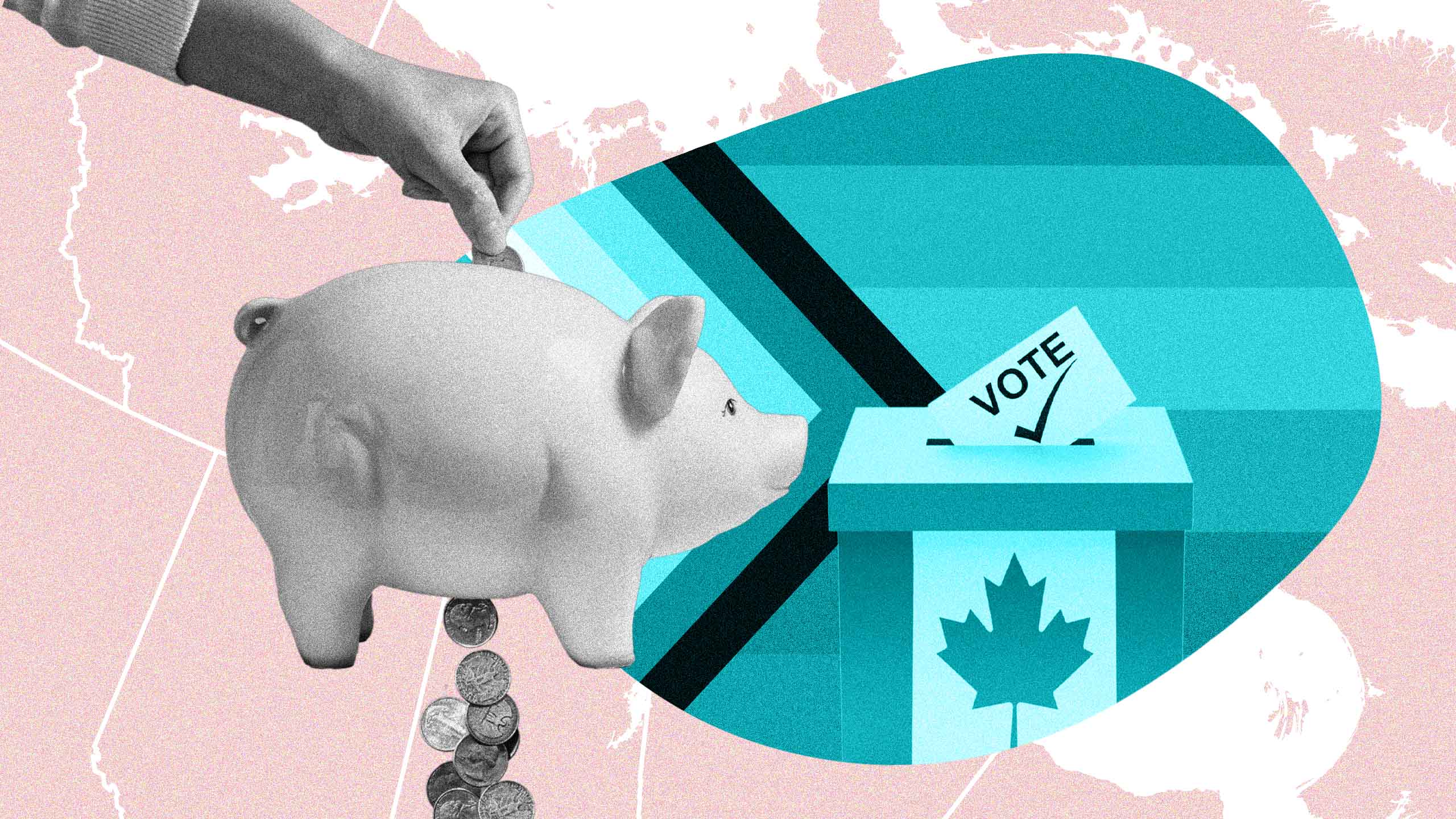In the run-up to Canada’s April 28 federal election, LGBTQ2S+ organizations are facing growing demand, limited funding opportunities and threats of violence. They’re calling on the next federal government to ensure that the needs of queer and trans communities are prioritized.
What’s at stake for LGBTQ2S+ organizations and the communities they serve?
Slated to be a close competition between Mark Carney’s Liberals and Pierre Poilievre’s Conservatives, there’s a lot at stake in this election for Canadians, including queer and trans communities and the organizations that serve them.
Alberto Jimenez Ponce, board member of Outlink, Calgary’s Centre for Gender and Sexual Diversity, told Xtra that federal elections directly impact the resources available to grassroots organizations, as they often mark a shift in the government’s priorities.
“If the incoming government places a strong emphasis on supporting marginalized communities, we could see increased funding for initiatives that promote inclusion, mental health and education, all of which are key areas for Outlink,” he explains. “On the other hand, a government that does not prioritize the 2SLGBTQIA+ community could lead to cuts in funding or the introduction of policies that limit access to essential services or protections for our community.”
Tyler Boyce, executive director of Enchanté Network, which brings together over 200 LGBTQ2S+ organizations and service providers across Canada, describes Enchanté’s advocacy priorities as threefold: sustained funding for LGBTQ2S+ organizations, rejection of hate and including queer and trans communities in decisions that affect them. According to Boyce, Enchanté is involved in conversations with all major federal political parties to include these priorities in their platforms.
For many LGBTQ2S+ advocates, the prospect of a Poilievre-led government is alarming. The Conservative leader claims to be unaware of more than two genders and opposes both gender-affirming care for trans youth and the inclusion of trans women in women-only spaces such as bathrooms, change rooms and shelters.
“We have seen Pierre Poilievre and the Conservatives repeat a lot of rhetoric coming from Donald Trump and the States,” says Lauren Pragg, executive director of Youth Line, an Ontario-based organization that runs a peer-support helpline for LGBTQ2S+ youth. Globally, Pragg says, “there have been some real moves to the far right, and we know that, obviously, LGBTQ2S+ people are not protected under those parties and under those systems.”
Nonetheless, Pragg is concerned about Carney’s actions, particularly the decision not to appoint a federal minister for the department of Women and Gender Equality (WAGE). Many non-profits serving women and LGBTQ2S+ communities rely on funding from WAGE, and have called for the minister to be reinstated. It’s possible that this change is only temporary, and the minister could be reinstated when a new cabinet is formed following the federal election.
“Either is not a safe bet for LGBTQ2S+ youth,” Pragg warns.
Increased demand for their services
Pragg tells Xtra that following the American election, Youth Line saw an increase in people accessing their helpline, many worried about how the outcome would affect Canadian politics. Although Pragg says it’s too early to tell whether the Canadian election will result in a similar trend, they believes that there’s a “general feel of uncertainty, powerlessness, confusion and … despair coming from young people.” Being used as election rhetoric and targeted as scapegoats in both the U.S. and Canada has impacted the sense of safety and belonging among queer and trans youth, Pragg explains, leading them to seek out services such as Youth Line’s helpline.
In Alberta, where some of Canada’s harshest anti-trans legislation has already been passed, Outlink has also seen an increase in demand for their services following the proposal of such policies. Jimenez Ponce says that they’ve also seen a rise in other service providers, including healthcare professionals and educators, reaching out to Outlink for guidance on serving their LGBTQ2S+ clients.
He explains that anti-trans rhetoric in Alberta has already contributed to a “hostile environment,” and any the federal government that “fails to challenge or counter these harmful narratives could embolden such views.” Jimenez Ponce goes on to say that exacerbated anti-trans sentiment and reduced access to gender-affirming care would put further strain on Outlink’s efforts to support the communities affected.
Sustaining essential operations amid rising hate
According to Boyce, the primary concern of Enchanté’s members and one of the organization’s advocacy priorities is sustained funding so that queer and trans organizations can continue to support their communities.
“It’s super clear that our communities and our community organizations are under attack, but we’re also underfunded,” says Boyce. “We have had a few of our organizations already declare bankruptcy because federal funding for queer and trans organizations is very much in limbo with this election period.”
Pragg agrees, highlighting how non-profits and community organizations often have to step in to deliver services the government can’t or won’t provide.
“It’s scary how many people rely on charities, and at the same time, we’re only able to exist or able to plan on the whim of different parties,” they say.
Many LGBTQ2S+ organizations, including Outlink and Youth Line, receive funding from WAGE, and are uncertain whether this funding will be available to them in the future. With no minister, WAGE has been assigned to the portfolio of Steven Guilbeault, Minister of Canadian Culture and Identity. In an email to Xtra, WAGE’s communications department stated that the transition does not affect WAGE’s mandate, and that the funding programs would continue as planned under the current government.
Apart from funding, Boyce and Jimenez Ponce both say that the absence of a WAGE minister has implications for advocacy.
“In this cabinet, there will not be a voice that is specifically for queer, trans, women and non-binary communities,” Boyce says, emphasizing that ministries with a specific seat at the table have more access to policy, legislation and funding decisions.
“It’s scary how many people rely on charities, and at the same time, we’re only able to exist or able to plan on the whim of different parties.”
Inadequate funding is far from the only threat that LGBTQ2S+ organizations face. In recent years, hate crimes targeting LGBTQ2S+ communities have risen dramatically. In 2023, police-reported hate crimes on the basis of sexual orientation rose by 69 percent from 2022, and 388 percent from 2016. Boyce points out that brick-and-mortar LGBTQ2S+ organizations are particularly vulnerable to being targeted, which is why Enchanté provides funding for security infrastructure through their Rainbow Resilience Fund.
Jacob Barry, former executive director of TransCare+, tells Xtra that the organization dissolved in March following challenges in securing funding and recovering from a hate-motivated cyberattack last July. They described their experience as a “sobering reflection” of what’s at stake for LGBTQ2S+ communities across the country.
“Despite the resilience of our team and community, the combination of that attack, significant funding losses and an increasingly scarce funding landscape led our board to make the incredibly heartbreaking and difficult decision to close the organization,” they wrote in an email to Xtra.
Mobilizing voters
Many LGBTQ2S+ organizations are doing work to mobilize voters around the needs of the communities they serve. Egale Canada launched their “Vote with Pride” campaign on March 25 to spread awareness about how key election issues such as housing, employment, healthcare and the economy affect queer communities. Although these issues are not unique to queer and trans people, they often experience the negative repercussions at a higher rate than their cis heterosexual counterparts, according to research presented in the campaign material.
Similarly, Youth Line is taking what Pragg terms a “proactive advocacy approach” by putting out communications helping first-time voters understand the political system and how they can engage with it.
“We want to help them understand where their power is, how they can join together with other people who share their values and influence the systems that have power over their lives,” Pragg explains.
Enchanté launched a campaign of their own on April 15 called “Pride at the Polls.”
“The goal of that campaign is really to sound the alarm on how queer and trans organizations are under attack and underfunded,” says Boyce, and “to really raise awareness around the importance of funding for queer and trans organizations at this moment.”
Preparing for the future
Pragg says that in the community sector, they’re constantly preparing for the worst outcome. “It could be anything really, that shifts the funding stream, even just your grant application not being accepted,” they explain.
Currently, Youth Line’s priorities revolve around diversifying their funding, supporting volunteers and helping youth to make informed choices regarding the election. Outlink is similarly focusing on building capacity through increasing volunteer intake and appealing to private and individual donors, according to Jimenez Ponce.
Boyce says that Enchanté is committed to continuing their advocacy and capacity-building efforts so that organizations can overcome both present and future challenges. They will also continue to support LGBTQ2S+ organizations through their Rainbow Resilience Fund, whose funding comes from the Department of Canadian Heritage.
Although LGBTQ2S+ organizations are facing many challenges right now, both Pragg and Boyce emphasize the importance of maintaining hope and continuing to advocate for marginalized communities.
Pragg encourages queer and trans youth to get involved in community organizing and look to past social movements to understand how the community approached similar hardships. “We hold a lot of power in the collective, and great social change can come from that.”
Boyce agrees, pointing out that LGBTQ2S+ communities have come together to fight injustice many times throughout history. “Queer and trans organizations have always had a vision for what society can be, and it’s brought us to places that we never thought we’d get to,” he says.
With the 2025 Canadian federal election underway, Xtra is bringing back our weekly pop-up election newsletter, Rainbow Votes. Subscribe now for free exclusive reporting, analysis and opinion in your inbox every Thursday.


 Why you can trust Xtra
Why you can trust Xtra


